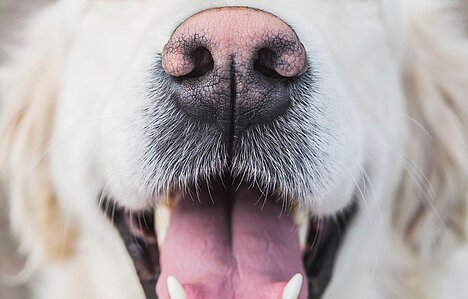Bad breath

Bad breath is a common problem in dogs that is not only unpleasant for owners, but can also be a sign of health problems. In this article, you'll find out what the most common causes of bad breath in dogs are and how you can prevent or treat it.
What causes bad breath in dogs?
Bad breath in dogs is usually caused by bacteria that colonize in the mouth, on the teeth or in the gastrointestinal tract. These bacteria produce foul-smelling gases that escape from the dog's mouth. The bacteria can multiply for various reasons, for example
- Poor dental hygiene: if the dog's teeth are not cleaned regularly, plaque and tartar can build up, which are ideal breeding grounds for bacteria. This can lead to inflammation of the gums, tooth decay and periodontitis, which increase bad breath.
- Incorrect diet: If the dog eats too much sugar, fat or protein, this can impair digestion and lead to flatulence or diarrhea. Certain foods such as garlic, onions or fish can also make the dog's breath unpleasant.
- Diseases: Some diseases can also cause bad breath in dogs, for example diabetes, kidney failure, liver problems or gastrointestinal infections. These conditions should be diagnosed and treated by a vet.
How can bad breath in dogs be prevented and treated?
To prevent or reduce bad breath in dogs, there are some simple measures you can take:
- Brush their teeth: Brushing your dog's teeth regularly is the best way to remove plaque and tartar and reduce the risk of dental problems. You should use a special dog toothbrush and paste, which you can find in any pet shop. It's best to get your dog used to brushing its teeth from puppyhood and make it a positive experience.
- Mouth hygiene: In addition to brushing your dog's teeth, you can also use other products to keep their mouth clean, such as chewing bones, dental snacks or mouthwash. These products help to stimulate the flow of saliva, clean the teeth and freshen the breath.
- Healthy diet: Make sure that your dog receives a balanced and high-quality diet that meets his needs. Avoid foods that can worsen breath, such as sugar, fat or protein. Also give your dog enough fresh water to drink to rinse his mouth and aid digestion.
- Visit the vet: If your dog's bad breath is very bad or does not respond to the above measures, you should see a vet. They can determine if your dog is suffering from a disease that is causing the bad breath and prescribe appropriate treatment.
Bad breath in dogs is not a fate, but a solvable problem. With a few simple steps, you can ensure that your dog has fresh breath and stays healthy.
The authors assume that a veterinarian should be consulted if an animal is ill and that medication should only be taken after consultation with a doctor or pharmacist. Only an individual examination can lead to a diagnosis and treatment decision.
We help you find the nearest vet → This way